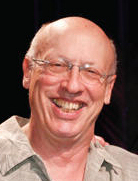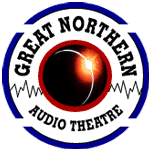Mar 2012
P Has Passed
Mar/09/12 16:47 Filed in: Firesign Theatre
Peter Bergman, co-founder of the iconic audio comedy team, the Firesign Theatre, passed away this morning, Friday, March 9, 2012, from complications related to leukemia.

He was “P”. the PoV character of the Firesign’s How Can You Be In Two Places At Once When You’re Not Anywhere At All, the one who bought the marvelous car from Ralph Spoilsport Motors. He was Lieutenant Bradshaw, who was always on about flat-foot Nick Danger. He was Mudhead, the broken-voiced teenage friend to David Ossman’s Porgie Tirebiter. And he was Mayor P’nissnose, of Billville, the town that Nature Forgot to Hate. He made me laugh.
Besides all that, Peter was once a CBS News anchor. He was the guy who coined the term “Love In” back in 1967, the Summer of Love. That’s when he was the Wizard of Radio Free Oz, that cultural rant radio program on KPFK in Los Angeles where the Firesign Theatre began in 1966, and again as the current audio blog of www.radiofreeoz.com. He made me think.
I was really looking forward to getting to meet him and work with him this summer. We’d invited him to our science fiction convention to perform and to celebrate the Fifteenth Anniversary of the Mark Time Awards for Science Fiction Audio. That’s another Firesign reference. The Awards are named after Mark Time, a short and hilarious skit in which he is the demagogue Prince Arcturus. David Ossman once said Peter was more genuine on mic than in real life. I am sad I won’t be able to meet him, and tell him how much he meant to me and to my sense of humor. I will always hear his voice as Clark Cable on Proctor and Bergman’s TV Or Not TV album. He’ll always make me laugh. Thanks so very much for all you’ve said, Pete.
Here’s one or our favorites of Pete’s, from Dear Friends, Duke of Madness Motors.

He was “P”. the PoV character of the Firesign’s How Can You Be In Two Places At Once When You’re Not Anywhere At All, the one who bought the marvelous car from Ralph Spoilsport Motors. He was Lieutenant Bradshaw, who was always on about flat-foot Nick Danger. He was Mudhead, the broken-voiced teenage friend to David Ossman’s Porgie Tirebiter. And he was Mayor P’nissnose, of Billville, the town that Nature Forgot to Hate. He made me laugh.
Besides all that, Peter was once a CBS News anchor. He was the guy who coined the term “Love In” back in 1967, the Summer of Love. That’s when he was the Wizard of Radio Free Oz, that cultural rant radio program on KPFK in Los Angeles where the Firesign Theatre began in 1966, and again as the current audio blog of www.radiofreeoz.com. He made me think.
I was really looking forward to getting to meet him and work with him this summer. We’d invited him to our science fiction convention to perform and to celebrate the Fifteenth Anniversary of the Mark Time Awards for Science Fiction Audio. That’s another Firesign reference. The Awards are named after Mark Time, a short and hilarious skit in which he is the demagogue Prince Arcturus. David Ossman once said Peter was more genuine on mic than in real life. I am sad I won’t be able to meet him, and tell him how much he meant to me and to my sense of humor. I will always hear his voice as Clark Cable on Proctor and Bergman’s TV Or Not TV album. He’ll always make me laugh. Thanks so very much for all you’ve said, Pete.
Here’s one or our favorites of Pete’s, from Dear Friends, Duke of Madness Motors.
Flood in the Backwater
Mar/03/12 21:12 Filed in: Audio production.
Flood In the Backwater or Going to the Big City
by Brian Price. March 3, 2012
As an independent audio theater producer I sometimes think back on what first attracted me to radio drama. I’d like to say I was immediately drawn to the little things one could do with nuanced sound and language, the subtleties, the poetry. That’s what I’d like to say, but of course, what got me first about radio theater was the BIG stuff—the closet falls, the cherries dropping into Lake Michigan, the space ships exploding—BOOM, BLAM, SPLATT.
Then, of course, what totally sucked me into radio theater as a “lifer” was that one could happily produce a lot this wonderful noise oneself. With the wonders of 4-track cassette recorders, pot and pans, and scratchy sound-effects records we could blow up planets, stage barroom brawls, and hold bowling tournaments in the jungle.
At first it bothered me that not everybody in the world, especially the United States, wanted to hear my first wacky productions. That included the neighbors, my parents and most of the radio stations in North America. It used to bother me that not everybody was interested in 25-voice, full-bore, multi-tracked, throw-everything-into-the-mix audio theater. I wanted my worlds to be saturated with sound. I figured the nay-listeners would come around.
A group that really never came around was book-on-tape publishers. They liked one voice, one book, one tone. But something has happened in the last couple of years.
Here’s the good news: More than ever before many more audiobooks are being produced by big publishers that include multiple readers, staged scenes, sound effects and music.
Here’s the bad news: Some of this material really sounds amateurish: Weird audio levels, dull acting that’s not in the moment, sounds drawn from 40 year old LP record collections.
What’s going on? Well, the audiobook publishers have finally found that audiences sometimes like theatrical performances of books, and are hitting a mean learning curve on multi-voice productions. Good audio theater ain’t as easy as it looks (or sounds). And over the years audiobook publishers haven’t been paying attention, listening to or practicing audio theater (except maybe for children’s books).
So far, audiobook publishers have been going to their usual sources to produce audio theater: Commercial voice-over studios, Industrial/educational studios or the publishers themselves. Frankly, the results are really mixed. These people aren’t audio theater people. They haven’t been listening and producing audio theater for years.
My prediction is that at some point pretty soon the audiobook publishers are going to get feedback from their listeners that there’s a whole ‘nother world of audio theater out there. It’s on community radio. It’s podcast. It’s handed back and forth on the Internet. It’s sounding better and better all the time.
The publishers are going to realize that they want, they need that sound—the sound of well produced modern audio theater. They’re going to send people back in the swamps of community radio and the Internet looking for it, looking for our kind. They’re going to be wearing suits. They’re going to have weird accents. They’re going to scare the kids and the dog.
They’ll be looking for the one thing audio theater producers do well—tell stories in sound. They’ll be looking to deal. They’ll smile a lot. Be prepared. They’ll be asking Audio Theater to do something it hasn’t done in a long time. Go to the big city.
Look for Brian’s column, The Sound of One Hand Clapping, Notes on Audio Publishing and Production, on AudiobookDJ.
by Brian Price. March 3, 2012
As an independent audio theater producer I sometimes think back on what first attracted me to radio drama. I’d like to say I was immediately drawn to the little things one could do with nuanced sound and language, the subtleties, the poetry. That’s what I’d like to say, but of course, what got me first about radio theater was the BIG stuff—the closet falls, the cherries dropping into Lake Michigan, the space ships exploding—BOOM, BLAM, SPLATT.
Then, of course, what totally sucked me into radio theater as a “lifer” was that one could happily produce a lot this wonderful noise oneself. With the wonders of 4-track cassette recorders, pot and pans, and scratchy sound-effects records we could blow up planets, stage barroom brawls, and hold bowling tournaments in the jungle.
At first it bothered me that not everybody in the world, especially the United States, wanted to hear my first wacky productions. That included the neighbors, my parents and most of the radio stations in North America. It used to bother me that not everybody was interested in 25-voice, full-bore, multi-tracked, throw-everything-into-the-mix audio theater. I wanted my worlds to be saturated with sound. I figured the nay-listeners would come around.
A group that really never came around was book-on-tape publishers. They liked one voice, one book, one tone. But something has happened in the last couple of years.
Here’s the good news: More than ever before many more audiobooks are being produced by big publishers that include multiple readers, staged scenes, sound effects and music.
Here’s the bad news: Some of this material really sounds amateurish: Weird audio levels, dull acting that’s not in the moment, sounds drawn from 40 year old LP record collections.
What’s going on? Well, the audiobook publishers have finally found that audiences sometimes like theatrical performances of books, and are hitting a mean learning curve on multi-voice productions. Good audio theater ain’t as easy as it looks (or sounds). And over the years audiobook publishers haven’t been paying attention, listening to or practicing audio theater (except maybe for children’s books).
So far, audiobook publishers have been going to their usual sources to produce audio theater: Commercial voice-over studios, Industrial/educational studios or the publishers themselves. Frankly, the results are really mixed. These people aren’t audio theater people. They haven’t been listening and producing audio theater for years.
My prediction is that at some point pretty soon the audiobook publishers are going to get feedback from their listeners that there’s a whole ‘nother world of audio theater out there. It’s on community radio. It’s podcast. It’s handed back and forth on the Internet. It’s sounding better and better all the time.
The publishers are going to realize that they want, they need that sound—the sound of well produced modern audio theater. They’re going to send people back in the swamps of community radio and the Internet looking for it, looking for our kind. They’re going to be wearing suits. They’re going to have weird accents. They’re going to scare the kids and the dog.
They’ll be looking for the one thing audio theater producers do well—tell stories in sound. They’ll be looking to deal. They’ll smile a lot. Be prepared. They’ll be asking Audio Theater to do something it hasn’t done in a long time. Go to the big city.
Look for Brian’s column, The Sound of One Hand Clapping, Notes on Audio Publishing and Production, on AudiobookDJ.




